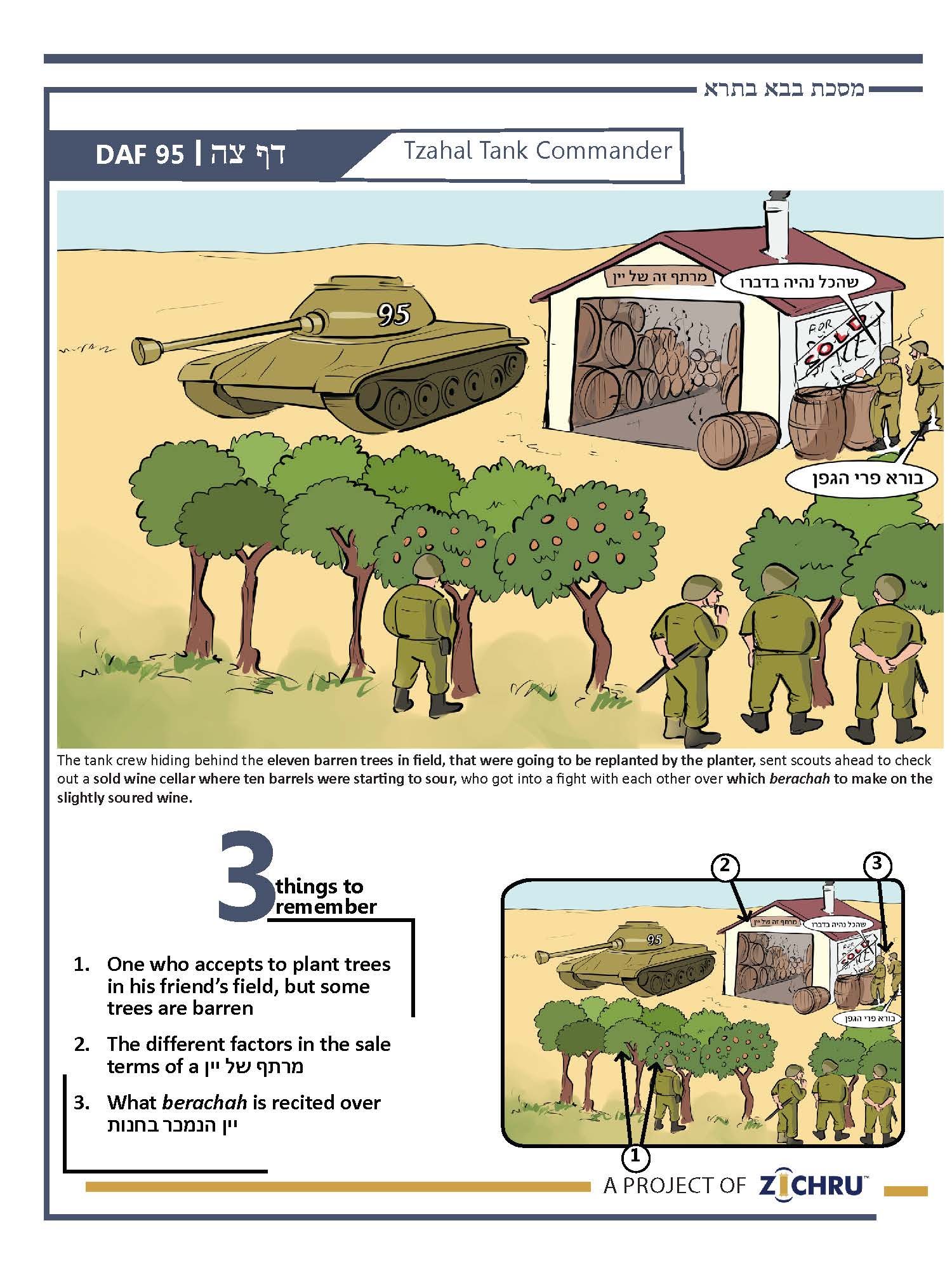Bava Basra - Daf 95
- Audio Timestamps
0:00 - The 3 Sugyos
2:10 - Review of 3 Sugyos
4:15 - Siman
5:20 - 4 Blatt Back Chazarah
For access to all Zichru resources including PDFs, and illustrations CLICK HERE
- One who accepts to plant trees in his friend’s field, but some trees are barren
The Gemara attempts a final support to Rav Huna’s ruling from a Baraisa: המקבל שדה מחברו ליטע – if one accepts to plant his friend’s field with trees, הרי זה מקבל עליו עשר בוריות למאה – [the field’s owner] accept upon himself ten barren trees per hundred, because this is a common percentage of barren trees, and he forgives it. If more than ten are found barren, מגלגלין עליו את הכל – we place the entire amount of barren trees on [the planter], and he must plant new trees in place of all the barren ones. This supports Rav Huna’s ruling, that if there is more than a רובע of impurities in one’s purchased grain, the seller must replace all of it. Rav Huna brei d’Rav Yehoshua said: כל יתר מכאן כבא ליטע מתחלה דמי – whenever more than [ten trees] are found barren, [the planter] is like one coming to plant a field from the beginning. Since the space for eleven trees lacks productive trees, which is a large enough area to be considered an entire field, we view the planter as beginning to plant a field of eleven trees, in which case he certainly must plant all of them.
- The different factors in the sale terms of a מרתף של יין
The Mishnah on Daf 93b taught about a purchase of a מרתף של יין – cellar of wine, that the buyer accepts ten barrels of קוססות – [wine] beginning to sour per hundred. The Gemara asks that this ruling does not match any of those in a Baraisa, which teaches that if a seller says: מרתף של יין אני מוכר לך – “I am selling you a cellar of wine,” נותן לו יין שכולו יפה – he must give him wine all of which is superior, with no souring wine. If he said: מרתף זה של יין – “this cellar of wine,” נותן לו יין הנמכר בחנות – he may give him wine sold in stores for immediate use (and may all be souring). If he simply said: מרתף זה – “this cellar,” אפילו כולו חומץ הגיעו – even if it is all vinegar, it becomes [the buyer’s], since “wine” was not specified. The Gemara later quotes another Baraisa: if the seller says "מרתף זה של יין" – “this cellar of wine,” he gives superior wine, but the buyer accepts ten souring barrels per hundred, and this is the case of the Mishnah. This Baraisa is where he requested wine "למקפה" – for porridge (i.e., flavoring foods), which must last for some time, whereas in the first Baraisa he did not, and so accepts “wine sold in stores.”
- What berachah is recited over יין הנמכר בחנות
Rav Yehudah says: יין הנמכר בחנות – wine which is sold in stores for immediate use (i.e., it is souring), מברכין עליו בורא פרי הגפן – one recites the berachah of בורא פרי הגפן, because it is still considered wine (for although it smells like vinegar, it still tastes like wine). Rav Chisda objected: גבי חמרא דאקרים למה לי – why should I [recite this berachah] over wine which soured? Rather, its berachah should be the generic שהכל נהיה בדברו. Rav Yehudah’s opinion was challenged from a Baraisa: על הפת שעפשה – over bread which became moldy, ועל היין שהקרים – and over wine which has soured, ועל תבשיל שעברה צורתו – and over a cooked food which lost its form through spoiling, אומר שהכל נהיה בדברו – one says the berachah of שהכל נהיה בדברו!? Rav Zevid answers that Rav Yehudah concedes בפורצמא דמיזדבן אקרנתא – regarding wine made from grape kernels, which is very inferior and only sold on street corners (where people indiscriminately purchase wine to drink), that one recites שהכל נהיה בדברו.
Siman –Tank Commander (צה''ל)
The tank crew hiding behind the eleven barren trees in field that were going to be replanted by the planter, sent scouts ahead to check out a sold wine cellar where ten barrels were starting to sour, who got into a fight with each other over which berachah to make on the slightly soured wine.


